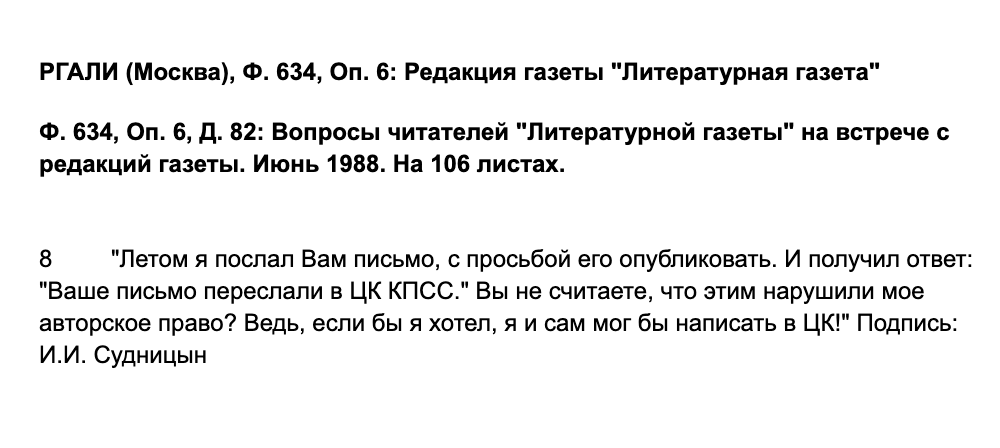Filed Under: Topic > Free Speech > A reader question to "Literaturnaia Gazeta"
A reader question to "Literaturnaia Gazeta"

Box 634, Folder 6, Document 82: Questions from readers of Literaturnaia gazeta at a meeting with editors. June 1988. 106 pp.
8 “This summer I wrote you a letter, requesting that it be published. And received this answer: ‘Your letter was sent to the Central Committee of the CPSU.’ Don’t you feel that by doing so, you violated my rights as an author? After all, if I’d wanted, I could have written to the CC myself!” Signed: I.I. Sudnitsyn
From the start of perestroika, the Soviet government felt that the media was essential to the success of Gorbachev’s reform as an important link between the government and the broader population. This view was not new to perestroika, but it took on new meaning as, with the encouragement of the government, media outlets set out to invigorate their relationship with viewers, readers, and listeners. The national weekly newspaper Literaturnaia gazeta (The Literary Gazette) was just one of many media outlets that held conferences with readers as one way of building their relationship with them. Part of the conference included the opportunity for readers in attendance to ask questions. They could write their queries on small slips of paper and submit them to newspaper functionaries running the event, as they did at a conference in June 1988. Again, this type of activity was not specific to perestroika, but documentary traces of these conferences suggest that, under Gorbachev, such meetings had acquired new significance.
This question in this artifact is from a reader identifying himself as I.I. Sudnitsyn, who asks why the newspaper forwarded a letter he sent to Literaturnaia gazeta to the Central Committee of the CPSU. “Don’t you feel that by doing so, you violated my rights as an author [avtorskoe pravo]?” he asks, tongue in cheek. On the one hand, it’s interesting that this reader would expect the newspaper not to send letters to the government. After all, the strong link between government and newspapers had been well established since the inception of the Soviet press and was, in terms of conveying public sentiment to the government, perhaps even stronger during perestroika.
On the other hand, Sudnitsyn’s question reflects a perhaps novel boldness and comfort readers now experienced: He signed his name to his pointed, sarcastic question. It also illustrates readers’ evolving understanding of the relationship between the government and the press: namely, one of greater freedom and clearer separation. Independence of the press from the government would be formally recognized with the Press Law of June 1990.